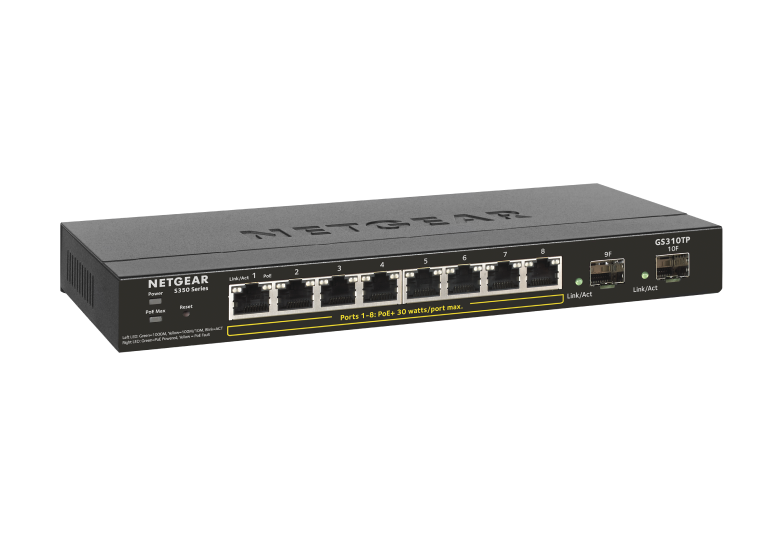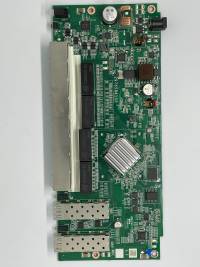Netgear GS310TPv1
The GS310TPv1 is a 8 + 2-port Gigabit L2 switch with up to 55 Watts of PoE+ power on the 8 Gigabit ports. It is part of the Netgear S350 Series.
Hardware
- RTL8380M SoC
- Winbond W25Q256JVFQ (32MB flash)
- Winbond W631GG8MB (128MB DDR3 SDRAM)
- RTL8231 GPIO extender to control the port LEDs, system LED and a reset button.
- Nuvoton ARM microcontroller
- Broadcom BCM59121B0KMLG PoE controller
Power is supplied via a 54V 1.25A barrel connector.
A Serial header is found at J1. Pins are Vcc(3.3V, Square), TX, RX and GND. Serial connection is via 115200 baud, 8N1.
Ports 1-8 can also provide power according to 802.3.at (PoE+) and PoE is controlled by the BCM59121. PoE management is done by an auxiliary Nuvoton M0516LDN microcontroller. Communication with the Poe-CPU happens via a serial port, connected to the main CPU's UART1. Optocouplers are used to isolate the two circuits from each other and the communication frames can be sniffed from J3 (3.3V, 19200 baud, 8n1).
To indicate the global device status, two LEDs are present on the front panel. One is labelled 'PoE Max', and is likely controlled directly by the PoE MCU. The other is labeled 'Power', and is used to indicate the device status. This LED appears to be an RGB LED, although it is currently unclear how the three colours are controlled. All ports have a two-pin bi-color LED, used to indicate the link status: green for 1000M, orange for 100M. These are driven by three SN74HC164 shift registers, using 20 of the 24 outputs available. PoE status bi-color LEDs are also available, with green used to indicate the remote device is PoE powered, and orange to signal a PoE fault status. The PoE-status LEDs are driven by two SN74LV595A shift registers, also controlled by the PoE MCU.
There is also a SN74LVC125A four-port tri-state buffer whose purpose is currently unknown.
Board details
Pin-outs
Serial console
- J1.1: 3.3V via R9 (not populated)
- J1.2: RX
- J1.3: TX
- J1.4: GND
Serial PoE control
This connector is in the PoE power domain, which is isolated from the power domain of the SoC. Be careful when connecting to this port and use a digital isolator.
- J3.1: VCC (appears not connected)
- J3.2: RX
- J3.3: TX
- J3.4: GND
Firmware
The switch ships with a bootloader based on Realtek's SDK for RTL83xx SoCs and Linux based on Realtek's SDK. It has a web interface for basic management, including firmware updates. The board identifies as RTL8393M_DEMO. But this is misleading. The SoC chip id is 83806800, which is RTL8380M_CHIP_ID according to sdk/include/hal/chipdef/chip.h in Realtek's SDK.
| Flash layout | |||||||
|---|---|---|---|---|---|---|---|
| Name | u-boot | u-boot-env | device-info | config | log | firmware1 | firmware2 |
| Size | 896k | 64k | 64k | 1M | 1M | 14.5M | 14.5M |
Vendor board definition
------------------ Board Configuration ------------------ *********************************************************** S350 Series 8-Port Gigabit PoE+ Ethernet Smart Managed Pro Switch with 2 SFP Ports *********************************************************** ============================ Board GPIO ============================ Device Pin Direction Default Current ------- ---- ---------- -------- -------- EXT 31 OUT (OUT ) 1 0 EXT 32 OUT (OUT ) 0 1 EXT 35 OUT (OUT ) 1 1 EXT 33 OUT (OUT ) 0 0 EXT 34 OUT (OUT ) 1 1 EXT 24 OUT (OUT ) 1 1 INT 0 IN 0 1 EXT 20 OUT (OUT ) 1 1 INT 13 OUT 1 1 EXT 25 OUT (OUT ) 1 1 EXT 10 OUT (OUT ) 0 1 EXT 7 IN (IN ) 0 1 EXT 6 IN (IN ) 0 1 INT 16 IN 0 1 INT 15 IN 0 0 EXT 14 IN (IN ) 0 1 EXT 13 IN (IN ) 0 1 INT 18 IN 0 1 INT 17 IN 0 1 EXT 28 OUT (OUT ) 0 0 EXT 27 OUT (OUT ) 0 1 EXT 11 IN (IN ) 0 0 EXT 11 IN (IN ) 0 0 EXT 5 IN (IN ) 0 0 EXT 4 IN (IN ) 0 0 EXT 12 IN (IN ) 0 0 ============================ Board Configuration ============================ ====== Port ================== Type Usr Phy Media Speed Duplex Attr ----------- ---- ------- ----------- -------------- -------- ------- 1000M 1 (0) 8 Copper (A) ALL Auto 1 1000M 2 (0) 9 Copper (A) ALL Auto 1 1000M 3 (0) 10 Copper (A) ALL Auto 1 1000M 4 (0) 11 Copper (A) ALL Auto 1 1000M 5 (0) 12 Copper (A) ALL Auto 1 1000M 6 (0) 13 Copper (A) ALL Auto 1 1000M 7 (0) 14 Copper (A) ALL Auto 1 1000M 8 (0) 15 Copper (A) ALL Auto 1 1000M 9 (0) 24 Fiber (A) ALL Auto 0 1000M 10 (0) 26 Fiber (A) ALL Auto 0 ====== Fiber ================= Fiber Port Number: 2 ------------ Fiber Detect LPort Present MediaChg OE Status LOS Status ------ -------- --------- ---------------------- ---------------------- 8 OE OE Enabled (GPIO:EXT_14) Enabled (GPIO:EXT_7 ) 9 OE OE Enabled (GPIO:EXT_13) Enabled (GPIO:EXT_6 ) ------------ Fiber Optical LPort I2C DEV I2C TYPE ID Delay SCK SDA ------ -------- --------- ----- ------- ------ ------ 8 0 8 BITS 0x50 1000 EXT_36 EXT_28 9 1 8 BITS 0x50 1000 EXT_36 EXT_27 ------------ Fiber TX Disable LPort Method ------ ------ 8 GPIO(EXT_28) ====== Button ================ ------------ Reset Button GPIO: INT_0 Timer: 3(sec) Action: Reboot Timer: 5(sec) Action: Restore Factory ====== Led =================== System (GPIO) GPIO: EXT_31 Alarm (GPIO) GPIO: EXT_32 Port Green (ASIC)Port Yellow (ASIC) ====== Reset ================= Type: GPIO GPIO: INT_13 ====== WatchDog ============== Type: REG ====== PoE ===================
Bootloader
U-Boot is used as bootloader for this device, and has access to a modifiable u-boot-env partition. This can be used to store modified and custom environment variables.
Some realtek-specific commands are also available:
rtk network on: Configure the ethernet hardware inside the bootloader (not enabled on boot).

